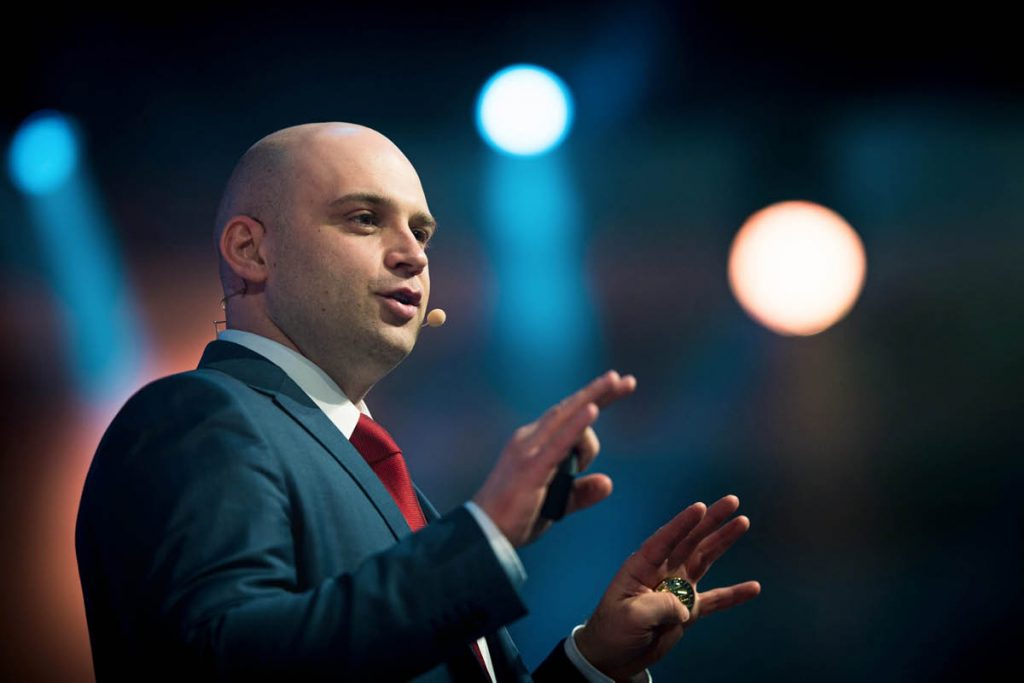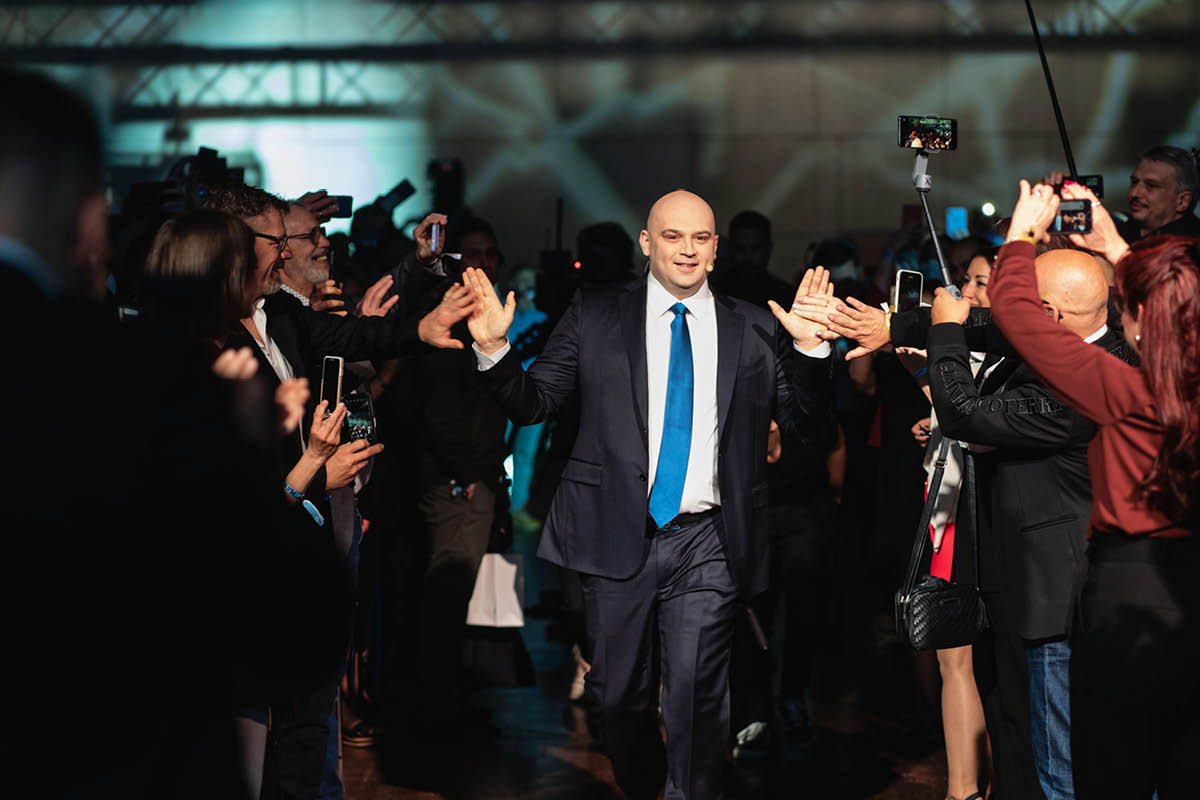Your success comes from a modest background, what motivated you?
I have always been motivated by inventions and by the smart and cool people behind them. I have been inspired by other people’s achievements. Since childhood, I have been fascinated by inventing and creating interesting, new and unusual things. In my university years, I assisted startups in attracting investments for their cool high-tech projects.
Learning how to form teams and formalise ideas was the most fascinating experience for me. Only later, after I had already learned how to create products from ideas, did something actually take form. Everything I do today is 100 percent know-how-based. I am also passionate about creativity. For instance, my team is currently funding a development of a yacht that can fly.
To be honest, I am less motivated by money. It is true that money is an indicator of performance, an indication that your products are popular, but the first thing that motivates me is to offer cool, ready-made products that people enjoy.
You are now a self-made man and CEO. Was that your childhood dream?
When we came to Germany, when I was fifteen years old, and I saw how tiring it was for my parents to handle multiple jobs, I dreamed that my parents didn’t have to work and that they didn’t need anything. And now I can say that yes, my main childhood dream has come true.
I am able to provide the standard of living my parents deserve, so they don’t lack anything. Travel, the life they dreamed of just because my parents dedicated themselves to us.
It is my parents who have worked hard, so we don’t have anything to worry about, and there are three of us in our family: I and my two sisters. I saw how difficult it was for them to adjust to a totally different environment. I wanted to somehow make their lives easier, so as soon as I could, I began working.
I started working when I was 17 to help my parents. It was very meaningful to just come and give money to my parents and say: “Parents, this is for you”. It is my belief that every successful CEO has a similar story to tell.
Over the course of your career, you’ve worked on launching a variety of projects. What advice would you give someone looking to launch a new business?
When it comes to starting a business, the most helpful advice I can give is to do it as quickly as possible. Making mistakes is a natural part of the process. Of course, you should try to minimise mistakes but don’t be afraid to make them. Fix these mistakes, fix your product and try again. Most importantly, do it today if you have an idea. Don’t delay. Don’t drag it out for an extended period.
Also, remember the longer you launch the product, the more money you’ll need and the less likely it will be to succeed. If you launch your MVP today, you’ll be able to tell right away whether the audience needs it or not, whether this product is in demand or not.
You’ll find out whether you like entrepreneurship immediately, since only 14 percent of people are predisposed to doing business, according to scientists. I think even less. You will instantly understand whether you want to run your own business or whether you should be an employee.
You could live anywhere – what made you choose Dubai as a place to live?
To start with, Dubai has become the absolute capital of the world a centre for culture, a centre for business, and a centre for success. There is no doubt that Dubai is the 21st century world’s financial capital, not New York. All the coolest, most interesting people are already in Dubai. Look for contacts in Dubai if you want to meet someone to discuss investment and growth.
Furthermore, Dubai is very safe, and it is very easy and comfortable to raise children there. As well as providing a superior education. Dubai has excellent and delicious restaurants. Thirdly, there is no professional that cannot be found or brought to Dubai. It is also a plus that the climate almost all year round in Dubai is comfortable. Apart from a couple of really hot months, the remaining nine to ten months in Dubai are amazing.

What led you to found the Alex Reinhardt Academy?
My goal was to create an online platform and a place where people could not only learn but also enrich their experience and knowledge. In order to make the academy platform free to all people, we spent a lot of money buying knowledge. That, in fact, prompted me, because people need information, people need knowledge, and if I can help them, that’s awesome.
In your book You Are Number One you teach how to become a leader. What is your single most important piece of advice for our readers?
Leadership is something you must learn, and you need to do it from small to big. You need to begin thinking about what I can give others who will follow me, and why they should follow me.
How has the fall of FTX and the so-called “crypto winter” impacted the overall outlook for the crypto industry?
As a result of the collapse of FTX, the crypto market has shown its weaknesses. We all know that even the biggest players cheat and risk their clients’ money. Security is lacking, businesses are often built incorrectly, they are not viable with no internal controls.
There are those in charge of large sums of money who do not seem to possess the slightest qualification. No one even looks at it. A few friendly relations could lead to billions of dollars in trade and mutual settlements. Employees often overuse their authority and, ultimately, are unable to take any responsibility. It seems that no matter what happens there, no one is responsible for anything.
Billions are burned in investments, hundreds of billions of client money are burned, no one is held responsible, no one gets sent to jail. The only response is “Well, yeah, it didn’t work.”
As the crypto market is subject to a cycle, there is always one year of growth and four years of so-called winter.
The cryptocurrency winter would have been like that if not for FTX, which made things more difficult. In the event of such giants falling, confidence in the market is severely shattered. People do not have the money to raise and develop the crypto market again. So that the market can come back to life quickly.
I think it will take several years for these resources to be worked out again. The crypto winter period is exacerbated by cases like FTX. Well, if the winter period was supposed to last two or three years, now it could be five or seven.
This is not to say that we will see no growth. The growth of the crypto market will be greatly slowed down, liquidity is reduced, and the community is slower to develop. Furthermore, regulators are now paying more attention to the crypto market – they come with swords and attempt to “cut off everyone’s heads”, hindering market recovery.
The Bitcoin blockchain currently consumes the same amount of power as the consumption of Thailand. Can cryptocurrencies ever be a sustainable source of finance? What can be done or improved?
First, cryptocurrency is just one asset, one instrument, compared to all of the other instruments, like real estate, gold, exchange trading, etc. In the sea of financial instruments, this is such a small drop that most businesses rarely notice it.
Cryptocurrencies are also very trendy, hot topics that people who do not have access to financial markets enjoy. Cryptocurrency is not subject to additional qualifications, and anyone can buy coins on an exchange or through an application, and then he is immediately involved in the cryptocurrency business. In light of this, cryptocurrency is a powerful tool for the general public.
Secondly, the general public lacks assets and financial cushions. Crypto tokens are mostly a financial instrument, a trading instrument that requires money management education, liquid funds, and the willingness to lose. It is critical to follow specific guidelines that many people ignore. As an example, you shouldn’t invest with your last funds, yet many people take out loans as a way of investing everything in one crypto asset. Well, they are losing a lot.

Finally, mining and resource consumption are also major problems, since technology cannot burn so many resources. There are only about 300 million crypto users worldwide.
If there were several billion users, they would burn half the planet.
As a result, I do not believe that cryptocurrencies will fully replace fiat money or gold.
A market like this is just one of the sources of assets, and it’s not as extensive as other assets. Consequently, let’s just say the topic of cryptocurrencies is strongly hyped and inflated. Cryptocurrencies are also not taken seriously on a global scale because they are still in the gray area, at least in most countries, without any links to taxation or regulation.
In spite of much talk about crypto and knowledge of the market, crypto doesn’t even make up a small percentage of global business. Blockchain technology is likely to take over in the future, maybe in some modified form. Because many of the cryptocurrencies on the market today consume a great deal of energy and are overplayed and uncontrolled, many will have to leave or modify themselves.
There is almost no other purpose for crypto assets other than speculation. Infrastructure is lacking, tools are lacking, user training is lacking; their application is not in the real market or the economy. It is a speculative market with a 95 percent loss rate and a 5 percent gain rate. Cryptos are not likely to occupy a global niche for a long time without serious losses.
Hence, I see crypto assets as being used mainly for speculation by a certain group of people. It is not a bad thing, but there are many other similar assets and tools available on the market.
How can businesses, and leaders, prepare for more widespread adoption of cryptocurrencies?
In business, there is no way to prepare, it uses the tools it has available, it does not develop its own tools. Cryptocurrencies, on the other hand, have two key functions: they are used for speculation and they are used for payment. Throughout the world, there are wire transfers, electronic payments, credit cards and so on.
Paying with cryptocurrency may be cheaper than paying with fiat, unless you need the fiat money at the end. There will be a commission involved in converting crypto to fiat. So what’s the difference? You either pay your bank the processing commission with fiat money, or you pay some intermediary for conversion. Worth noting is that cryptocurrencies may come with unforeseen tax risks. Cryptocurrencies are volatile, and since their price might rise, you will almost immediately have a tax liability.
On the other hand, if the cryptocurrency price suddenly dropped, you would have lost money. Imagine your product costs $100 and you receive a crypto payment when the crypto price falls. You only get the equivalent of say $50, resulting in unforeseen losses that you were unaware of. Having said all that, cryptocurrency may still be useful to businesses that earn and, most importantly, spend in crypto.
There are more and more crypto communities appearing, people united behind a crypto project and integrating this crypto project into every aspect of their lives. There might be a crypto future here… Time will tell.

